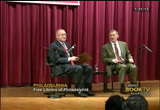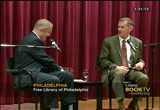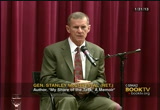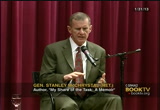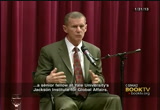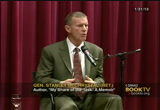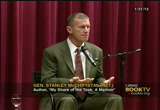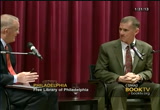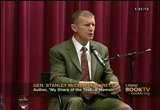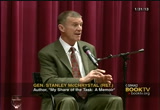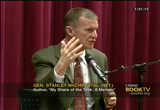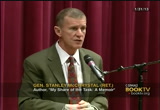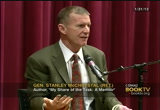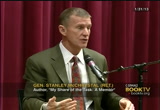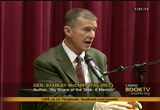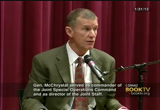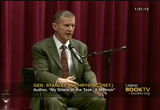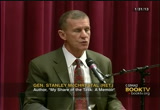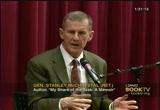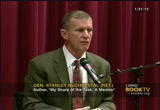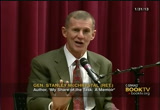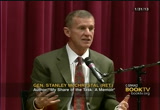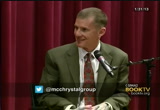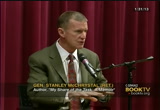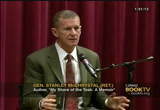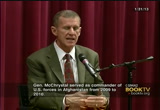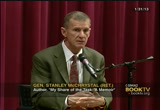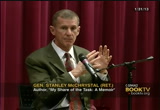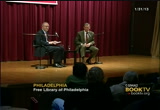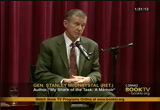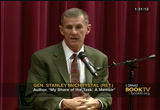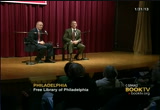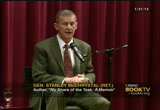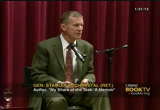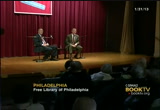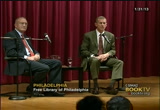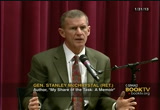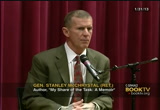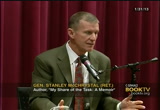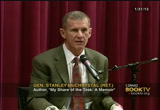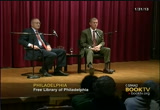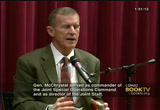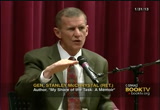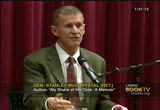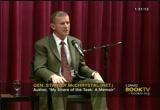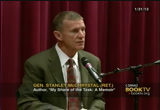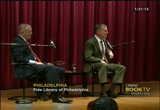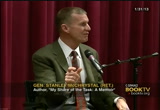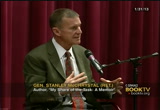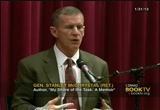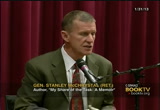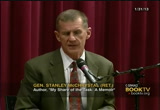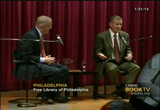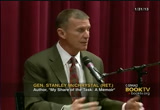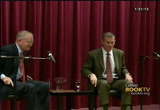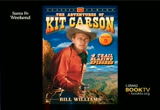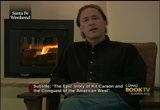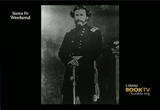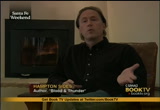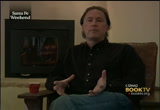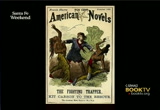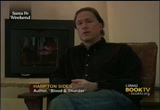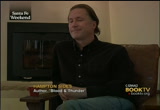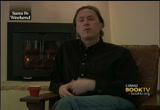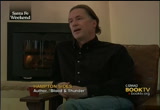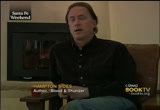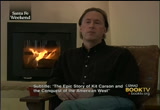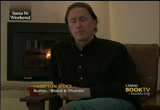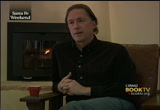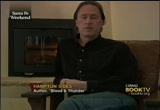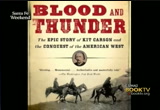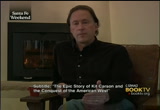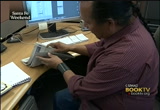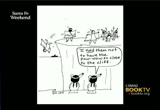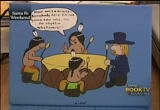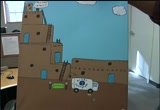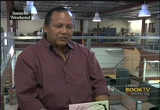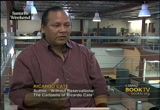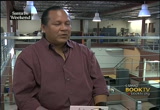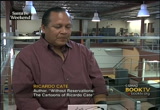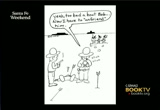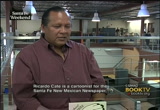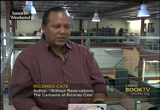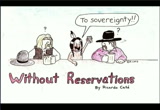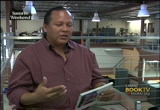tv Book TV CSPAN February 3, 2013 4:30pm-6:00pm EST
4:30 pm
press in albuquerque produced this beautiful book. collected works sold the book at the event, and we had some leftovers. those leftovers went to the city, extra stock. it then went as a part of a sister or city program with a local gentleman down to mexico and went to children in mexico. so there you have the literary arts, the performing arts, the educational value and the city cultural outreach all in one volume. form an allegiance to it. if you don't like what they carry, tell them. a lot of what we order comes from suggestions from our customers. i wish you had this book, i wish you had that book. and we'll get it for them. and very often we'll get another copy for the store, and very often that will sell brick quickly. so go to your local store whatever you're trying to buy.
4:31 pm
see what they have, talk to the people. these are your maybe the neighbors. -- these are your neighbors. >> for more information on booktv's recent visit to santa fe, new mexico, go to c-span.org/localcontent. and now, general stanley mcchrystal discusses his memoir, "my share of the task." in the book the former commander of u.s. forces in afghanistan recounts the major turning points in his 34-year military career which ended in 2010. this is about an hour. [applause] >> well, thank you very much. thanks for coming out. i think this is a wonderful opportunity. the gentleman sitting next to me is kind of a big deal. [laughter] for anyone who is, pays
4:32 pm
attention to american foreign policy and military affairs, you know that ever since the attacks on this country on 9/11 the united states has had to evolve militarily, in our intelligence community, in many ways to meet the challenge of this new enemy. and more than anyone that i can think of, general mcchrystal has been responsible for shaping that evolution and developing the what i call the targeting engine which is what we have, i think, adopted as our primary method of defending the country. so thank you for being here, general mcchrystal. the great to see you. >> thanks, mark. thanks for a too-kind introduction. i always thought of you as a nonfiction writer, but you're free to go into fiction now. [laughter] >> now, i know that our -- you were the commander of our special operations in iraq and
4:33 pm
afghanistan, and there has been, as i mentioned, a rapid evolution. i'm familiar from writing black hawk down with the way things were back in the early '90s. can you give us an idea of sort of the overall strategy that's evolved, and we'll get to specifics maybe, but also the tactics that you've developed. >> well, not me. a group of people did, thanks. take you back a little bit. at the end of the vietnam war, as america has done at the end of other wars, the special operations units that are created essentially get gutted, or they get disbanded entirely. there's a bias to do away with them. and in the late 1970s, american special operating forces when i first joined the green berets or special forces, they were really in pretty pathetic shape. and they were barely a shadow of what they had been at the heydey of the vietnam war. in 1980 the mission eagle claw
4:34 pm
was launched to try to conduct a rescue mission into today hand to rescue american citizens held hostage in the embassy. and it failed. and it not only failed painfully, it failed for many reasons, one of which was our special operations community while we still had people who were brave and strong and what not, they were not capable of doing very come flex things -- complex things, and that was a very complex endeavor. and so it failed. and from the ashes of that, there was a report called the hold o way commission, and it recommended we take a look at our capability to do this kind of operation and the structure to do it. i entered special operations a few years later as a young ranger officer, and i was able, and i try to tell this in great detail in the book pause when you start to build a special operations capability as we were redoing in the early 1980s, the first thing you do is go find stereotypical special
4:35 pm
operators. typically guys with big shoulders, big knuckles, good shots, brave and all that sort of thing. and that's important. you've got to have that. but it's really the easiest part of creating the organization. because what you have to do if you're going to do complex operations, you have to have a huge intelligence capacity, you've got to integrate that with operators, you've got to have aviation ability to bring in this all together, and most importantly you've got to have a culture. and that culture has got to be very mature. that's the word i'd use very carefully. it is not a culture of of of stereotypical rambo-kind of things because that's not the way special operations succeed. that's how you lose. and so you have to build a culture that a is evolved of problem solving, and problem solving in which building teams does that. so what happened is we went up through the first -- i was in the rangers and then joint special operations command through the first gulf war where we did scud hunting, hunting for iraqi missiles out in western
4:36 pm
iraq. and we were getting better and better at what we did. we all paid huge attention to what mark wrote so brilliantly about in black hawk down. that was the operation mogadishu. we went to school on that experience aided by the document that he had written on an operation that had gone very badly but then had been, essentially, dealt with by the force on the ground with extraordinary courage. but a lot of holes in what we could do came out. we came out as a fairly brittle force, ie, if everything went perfectly the way you planned it, then you're in good shape. but when things started to go badly, as they so often do, how do you deal with it? do you have the resilience to deal with it? so we started to try to fix that and to make it a more flexible and resilient force. we went up to 2001 after 9/11 and, of course, the first operations in afghanistan, toppling the afghan government, driving out al-qaeda were some
4:37 pm
brilliant, deep raids. and in iraq with the initial invasion, same thing, working against a nation-state. but where we found ourselves in really late 2003 which was when i returned to special operations is you remember b in the spring of '03 the invasion of iraq went sort of surprisingly well or deceptively well, and suddenly things in iraq started to go very badly in the late summer. we had a sense that if we could just arrest saddam hussein, that that would potentially stop the problem, and what happened was we did. the force found and arrested saddam hussein, and that didn't. what we found is what had grown sort of beneath the surface was a cancer-like network led by a guy named zarqawi who had created an al-qaeda-related organization. it wasn't technically al-qaeda at that point, but it was a combination of foreign leadership and frustrated iraqi sunnis, and they were a network, and they were not a small
4:38 pm
organization trying to do one or two things. they were trying to run an insurgency using what we call terrorist tactics. so suddenly the force that had been beautifully designed and honed to a fine edge for very precise but very episodic, occasional operations was unprepared and unable to do the wider problem. it's like having a s.w.a.t. team for your police force for all of philadelphia, but in reality if you can't cover the whole city and you can't do a lot of things, that one s.w.a.t. team can never be decisive. and where we found ourselves that began the significant revolution, where we began to change dramatically. >> right. in somalia i think task force ranger had been there a month or two before or the big battle that i wrote about, and during that period they'd launched six missions. so the pace was intelligence gathering, finding targets, planning and operations -- sometimes very quickly once that
4:39 pm
intelligence came together -- and then launching a raid. describe how, what op tempo means and exactly how that applied in iraq. >> that's very interesting, because mark's got it exactly right. there were a series of raids in mogadishu that happened days apart. so you gather intel, you get it together, you make a decision. when you set yourself criteria to launch, when those criteria come, you launch. but it's a pretty centralized, pretty deliberate process. when we got in iraq, we were originally doing that, and we would have this precise thing. and what we found is we were having an effect, but very narrow. and we would go on a target, for example, we would go and pick up an individual. this may or may not be a fight. if we captured him and his phone and documents and other things, we'd capture all those things. but the force, one of our small forces around the country would do the operation. then it might take a day or two for them to send the individual back to our headquarters where
4:40 pm
we could begin effective interrogation. and the stuff that was captured would typically go in a plastic garbage bag, and it would be written in arabic typically, and then there'd be a computer. and it would come back, and it would be 48 hours old before it got to the main headquarters, and then it would sit there because we didn't have translators to do it. and when i first took over, i went in this room, and there's a pile of this stuff that hadn't even been read or exploited, as we'd call it, digested for intelligence. and counterinsurgency or counterterrorism is all about intelligence. whoever knows the most wins. and so we had this incredible inability to digest information, process it and then operate. we started to get where we could be a little bit faster, but we developed a system called f3ea for find, fix, finish, exploit and analyze. that's a cycle you go through. you find somebody, you fix them in a location at a time now, you finish by capturing or killing,
4:41 pm
you exploit whatever you capture, you analyze that, and you learn from it. it's basically a learning cycle, learning and action, and we would do that. and we would go through that process, but it would be painfully slow because we were operating with different organizations, not all organic to mine, and different agencies. intelligence agencies and what not. and this may surprise you, but not all parts of the u.s. government work together seamlessly. [laughter] so here we are as this cycle, and we have these things, what we call blinks between the parts. and so one element would find a target, but by the time the information got to the people who were going to fix it usually with a predator or something like that to make sure they're there then, time would have passed, and as crack si of information fidelity would have passed. again, have a loss. it's like the game telephone where you whisper around the room, and it's un intelligible
4:42 pm
by the fifth person. we're trying to do things, and we're saying, this is madness. it's not going to work. so we started, we went on a campaign to fix that process bringing in different parts of the organization, building our intelligence capacity, giving yourselves a mindset that was different before. and before it was as if each element l did its part of the process, then they could take great pride. we succeeded, we did what we were told. and we wiped that clean and said nobody is successful unless the whole process works. the definition of winning is the same for all of us, only if we win this fight. and that was quite a bit different than what we'd had. by the summer things got really bad, starting in late march of 2004 in iraq, and that's when the country basically melted down, and we started operating as hard as we could. and op tempo that mark refers to is operational tempo. it's how fast you can operate. and we realized the size of zarqawi's network, that we were going to have to hit it a lot.
4:43 pm
and we weren't going to be able to hit it once a month. and by august of 2004 we got up to 18 raids a month or about one every other night. and we thought we were moving at warp speed. i mean, literally, we thought this is the most amazing thing we've ever done. we are the most efficient and effective special operations task force on the face of the earth. we were, but we were still losing. so we came to the conclusion that we have got to speed up more. and there had been this fixation on just going after the leaders, high value targeting, decapitation. and we came to the conclusion that that budget going to work. it was sort of simple. we started the war with the idea if we got zarqawi, the organization would fall apart. but think about any organization, if the key person gets taken out, does it really get worse? i worked in the pentagon, it would have made it better. [laughter] so we realized you've really got
4:44 pm
to go after the people who do logistics, communications, pass information, build car bombs, communicate. you've got to take those out. and so we came up with a strategy, and i know philadelphia will love this, but i used to tell people it's like rocky balboa and apollo creed. we're going to hit them in the midsection, and we're going to hit them a lot. so from august 2004 when we did 18 raids, two years later same force, same fight we were doing 300 raids a month. that's ten a nightment now, if you stop and you say, well, ten a night, that's a lot, that's impress e. that means every raid guy on the force is going on a raid at least one raid every night. every pilot's flying one or two raids every night. and these raids are not patrols. this is not a foot -- these are going in the door, somebody's getting shot. extraordinary. and to do that, though, you can't use previous systems. one, you've got to be able to
4:45 pm
bring in this intelligence on an industrial scale. you've got to be able to -- we got to the point where instead of the plastic bags of information on a target, we would start to exploit their computers, their phones, we would take biometric data. it would be pumped back to west virginia right from the target to see if we'd ever had that person before and if we'd ever even had any dealings with them. we would move the documents back, immediately scan them, send them back to multiple places in the u.s. and in theater, and everybody would be ap rising at the same time. and we would be trying to turn this to learn as quickly as we could. and we got to the point where we could hit three targets a night from the initial intelligence. we would find joe smith at 9:00 at night because we'd been looking for him. we would find out from what we got on that target about john doe, we might hit that at midnight, and we'd hit another at three in the morning. and the reason it was important to go fast is because terrorist
4:46 pm
networks repair themselves very quickly. as soon as if we were terrorists, as soon as mark is captured, pretty soon i'm going to hear about it. and the first thing i do is i move my location, and i change my -- all those things, connections that i have, and you call it cutouts because it moves to repair itself. so you've got to be quicker than they can repair themselves both to hit targets and also quicker than they can promote new people up, develop new leaders. and over time we started seeing the relative age of leaders of al-qaeda in iraq go down and the relative effectiveness go down because of that. so the op tempo became the rocky balboa strategy of pummel it as fast as you can so it can't breathe. and then over time had the decisive effect on it. which we actually did along with a number of other factors. >> one of the things i think that's very interesting to me about that change and increasing the tempo is the role that technology played. i mean, obviously, we've seen
4:47 pm
the development of drones, we've seen the application of supercomputers. of one of the things that you did was move intelligence analysts out into balad, into your base there integrating everything up front. can you talk about that a little bit, the role that technology played? >> yeah. there are several things of technology that changed the fight. one is obvious, it was of predators. it wasn't drone strikes, it was drone surveillance. because you put a surveillance that give cans you full motion video means that anywhere on our force to include the guys on the ground could watch what the predator's watching in full-time video or realtime video. the real effect of that is several. one is where it used to take let's say 120 people to raid a target when only 20 were going inside, it takes 100 to secure it outside to make sure you don't get people reinforcing, what not. if you can do it from the air, you only send 20. now, the other hundred can hit
4:48 pm
five other targets. so we could hit six targets in the time we're hitting one, and you know so much more. also you can put drones over, and you can watch people all the time. if we decided to watch someone in this room all the time, pretty soon we'd know what you call pattern of life. we'd know where you go, who you hang out with, what you do, how you walk and whether you're good or bad or involved in the insurgency. so you can build up this knowledge, and suddenly you're very precise. you're not just picking up a bunch of people, you start to know a lot. so that's one technology that dramatically changed it. another was night vision. we had night visit on all of our force. all of our helicopters, everyone. and what that meant was you could, of course, see in the dark, but in fire fights you are absolutely dominant because we put laser-aiming sights on all our weapons. so the enemy are not as well trained as our guys, but we have this incredible dominance so
4:49 pm
firefighters, our ratio is probably a thousand to one in terms of people getting hit back. now, the problem is we don't have that many guys, so the ones mount up. and every time you lose a person, it's a huge cost because they're so well trained and so valuable. but you still, you have dominance, and you have the willingness to go places and do things that you wouldn't otherwise. the other one that's less obvious is just the ability to communicate. video teleconferences and not so much radio, but video teleconference -- we did use radios, but, for example, we would take all of our radio nets that was happening on the ground. we would pick them up, and we would put them into our classified computer network system. so every -- we had a technology that allowed you to sit at your laptop p wherever you were or in afghanistan, iraq, anywhere. you could watch from above what's happening, and you could listen to their radio nets from our side down to at the team
4:50 pm
level. now, you say, well, then i could micromanage. we didn't. we never micromanaged, but you could reach down, and you had this situational awareness which allows you to get going. you can move medevac, fire support, you can do a lot of things to help that a force or very quickly. and then the other thing that it does is if you're going to be effective against an enemy network, you have to be a better network than they are. think what your network in life is, it may be people in your church, where your work, family, a combination of things. and how you communicate with them determines often the strength of how you share information. you know people for 50 years, you know 'em pretty well, you don't need to communicate as often. we started every day with a 90-minute video teleconference with the whole command. thousands of people. and we pumped information. we had a conversation about updates on intelligence, updates what happened, updates in
4:51 pm
operation, senior leaders, every day i'm on it with all the people. so everybody hears the senior leader every day, and they hear the conversations, plus they're hearing information go up and go down. so we created what we called shared consciousness so the whole organization knows what we think the situation is, what's happening, where it's going. the effect is it decentralizes decision making. if everybody knows what the corporate leadership's trying to do, they know what we're trying to do, they just make 'em. and we didn't ask them to come up for decisions. i didn't make tactical decisions, hit target xoy because i wanted them to do that. i gave them an effect. i said here's what we've got to do in this area, create this effect, defeat this network. you figure out how to do it. the only thing i gave was sort of constant pressure. and that revolutionized the way we could operate. and it was communication at the heart of it. >> one of the things that you mention in your book, general, is how i, um, the emotional
4:52 pm
impact that this kind of video conferencing had on, say, an intelligence analyst in working in a coupe cl in langley who's getting briefed by the guy who went out and acted on the investigates that they just provided. what kind of effect did that have? >> we talked about cultural differences, and one of the things about special operators is you're brought up to have this tribal culture. it's very macho, and a little bit intimidating, intentionally so. and so people who keel -- who deal with them are often a little hesitant. but the operators don't have all the expertise. you really have it in your intel people and what not. as we started to grow, we became a meritocracy because we were communicating so much. and so in one case i remember vtcs, you'd see an operator communicating right back with a young analyst back in the united states or somewhere, and the operation had occurred because of of what the analyst had done. and the operator's going, hey,
4:53 pm
jim, great job. you know, all part of the team now. another case you'd go into our forward headquarters which we pushed operators everywhere, and we rotated analysts so everybody operated forward and back. and i'd see a big, macho operator leaning over a plywood table -- everything in the command was plywood -- and there'd be a 22-year-old female analyst weighed like 98 pounds, and she's got her finger in his chest saying when you do this, you've got to do x, x -- and he's taking it because it became a meritocracy. it wasn't perfect. this took years for us to get to, don't get me wrong. and there were stops and starts and constant stresses, but it was key because suddenly everybody owned the problem. >> right. one of the things you also touch on in your book is sort of the evolution of interrogation which is a very hot topic here. and you mention early on there was use of these enhanced interrogation methods. you evolved away from that. can you talk about that a little bit? >> sure. how many people here have ever
4:54 pm
run a prison or an interrogation facility? [laughter] that's how many we had in my command. [laughter] and if you think about it, go back to 9/11 and the first response is, okay, what do we do? how do we do this? we start capturing very serious terrorists. so what do you do? well, we'll bring the specialists in. they're literally weren't any. there literally weren't any. so how do we do this? so people go back to history books, we went to -- there's man manuals on how to interrogate. but most of the manuals that were written in the military were designed in a conventional war between two armies where you catch private x of the soviet army and you're going to ask him questions, that's the way they were designed. we're talking about guys that are in a terrorist network and some pretty hardened people. so we had to learn our way through it. as you can see, the nation had to come to grips with how we feel about this. we're still doing that with
4:55 pm
guantanamo and where we're going the try people. it's still an ongoing discussion. but if you remember after 9/11 people jumping out of twin towers holding hands to their death, it was a different period. everybody wants to remember it now as we're sitting in philadelphia. i'll also remind you that in baghdad we were literally knee deep in blood. it was unbelievable what was happening and the torture chambers we were finding and what not. so against the backdrop of losing comrades, we had to take our interrogation techniques and figure it out. we were originally authorized to use what they call enhanced techniques which really wasn't or very dramatic. it was you could limit a detainee to four hours of sleep a night. you could make them kneel down in stress positions. and i don't agree with that, but that's the limit -- there was no beating people, there was no waterboarding in anything i ever was involved in or saw, in fact. but the nation had to come to grips with it, how we do this.
4:56 pm
couple of things. first, we learned that the best way to deal, to get information was long periods of conversation. very respectful, very persistent. the individual that finally led us to the spiritual adviser for zarqawi, and i take this in great detail in my book, we'd had him for weeks. and at one point, you know, we did movie night with him. we had two primary interdaters with him, and they -- interrogators with him, and they'd been talking to him every day. they finally said, well, let's take a night off and have a movie. they all three sat there together and watched the movie. and it was the exorcist. [laughter] but, i mean, that's the way we did it. and you just over time -- what you try to do is you convince that person that they want to communicate. now, they'll do it for lots of reasons. sometimes because they're scared of being prosecuted within iraqi law. sometimes because they're boastful. sometimes because they're
4:57 pm
worried about their family. i mean, there's any range of reasons, and interrogators want to use whatever reason's there. but at the end of the day, you've got to convince them that they want to give you information. the problem with torture -- well, it's multiple levels of problem with torture. the first is there's sort of an academic argument of whether it works or not and whether the information's good. in the interest -- i don't know. haven't tortured anybody. but it's almost irrelevant. what happens in torture is you hurt yourself. the torturer crosses a line and becomes something different from what you're raised to be and what you believe in. once you do that, i don't think you can come back very easily. now, the problem is you're dealing with people who are either pressed for time. czarzarqawi was killing thousanf iraqis as well as many of our guys as well. you feel the press of time, and you also see your comrades being
4:58 pm
killed, you see this extraordinary thing, and you say i gotta stop. the ends justifies the means, and you have to stop there. it doesn't because you corrode the force. and the other thing that happens is the worst thing that happened to us during the whole war in iraq was abu ghraib. because what happened is those pictures that came out we all believed were an aberration, and i think they were. but to many people in the muslim world, they were proof positive that america does that by policy. and we had thousands of young men coming from north africa, saudi arabia and other countries, because they had seen the photos from abu ghraib. essentially, we had to kill most of them, but they were amped up on a vision of something that net preconceptions about the u.s. so if you let terror or if you let torture become a policy, that's what happens. you mobilize your foe. you mathematically increase your
4:59 pm
foe, and you mobilize them. so any information you get, in my view, is much less valuable than the cost of getting it. >> well, i could ask you a thousand more questions, but i think i'll share the wealth. we are, this is on television, so we have speakers -- we have, actually, amplifiers or whatever. so wait for them to come give them to them before you ask a question. i'll start with my friend, trudy rubin. >> hi, trudy. >> should i stand up, or does it matter? >> get in the push-up position, trudy. [laughter] >> i would never get to the question. >> that's the idea. [laughter] >> um, you have said and written that you feel drones alone is an insufficient policy. i wonder if you would talk about why you feel that and, also, given the weariness in the
5:00 pm
5:01 pm
in some cases you would make it worse because many people would experience the exposure, even though they knew the person was a dealer, they'd be offended at the fact that you do that. put that in a sovereign country and suddenly you have a theory of the good tool to get the perception of violation of sovereignty, a perception even though the shop they only kill people absolutely guilty, the perception of everyone if they were civilians they are noncombatants. so very quickly there's the impression the united states uses power with a certain arrogant and when that happens, you lose potential support. if i'm correct and i may be just a little dated, but american popularity is not high. at one point it was below india. that's impossible. the people who are most upset
5:02 pm
about drum strikes inside pakistan were not people in the waziristan region where most of the term strikes occurred there in other parts of the country. so they're outraged about the theory of it. but it's important because people act on perceptions. i think we need to have that capability. we need to use it, but we need to be real amateur with ink about it. you create negative forces with long tension positive things so it's got to be balanced. >> the gentleman in the sweatshirt back here. >> what was the second part? [inaudible] >> the question as with the war weariness imparted in a season
5:03 pm
situation ground, what should our policy be? the answer is i can't tell how many we have to spend our name. but i do think is simple fold. we are there. they did the medicine 2001. we met our goal to get rid of al qaeda. we have under the taliban government and set the country started into screenplay, we developed some more responsibility for helping him set a rate third, i think it's an america in the center a stable region. if afghanistan were completely unstable, who'd be very tenuous but it's important. we need to be consistent and persistent in the region.
5:04 pm
the reason people in afghanistan are so nervous is because in 2004 they think we're going to leave and 18 asleep before. in 1889, we turn from the region. it doesn't matter whether each individual afghans saw that, it's become commonly accepted truth they don't have other strategic allies. so what they're looking for in my view is the idea of a long-term strategic partnership. but i think that's a specific number of troops, even a specific amount of money. their fear is they are very far away. i was asking him this question. i said what you want in the future years quite homage to see what here? said a word about business and i'll be here taking money.
5:05 pm
because if you're making money here come the 11 interest in our stability. will be good for you and good for us. the fear of afghanistan is landlocked, don't make anything we need and we will care. pakistan has many of the same feelings. people say pakistan wants us out of the region. i have a different view. they want us in the region otherwise to be consistent and stay there. the fears they will come in and pull out again and up and things cause issues. >> i've been in the peace movement for the last 30 years. i was in iraq in december of four and try to in the park in my up the abu ghraib prison and that they would not let us in. my question i considered the elephant in the room. i see our current military is dealing with the american people
5:06 pm
who paid stairway and stealing in two distinct modes, one secrecy in one public relations. icu is a master of one leg in each of those. you of course were one star briefer for the price during the shock and no invasion. my question is given a vast amount of secrecy that is necessary for the culture that you're evolving very brilliantly i would concede, does it ever concern you one impact this has on democracy and the citizenship it really doesn't know what the heck you're doing. it's a very important question and the rest of the sort of things you do and i wonder if that concern you at all. >> if i understand your question
5:07 pm
i am in many ways that i.q. has been on the peace movement for a long time as well. if i understand your question chemie word about the balance between necessary secrecy and wider secrecy because there's a certain amount of necessary secrecy if you have a son or daughter serving and essential information is given on the whereabouts of their plans come as they more vulnerable. it's a very real problem. if we have any desire to collect intelligence in the world from sources, people want to give it their identities and safety must be paid. there's a requirement for secrecy that's very real. it's balanced against your wider point, which is really, are the american people informed about the policy? i don't know if you read daniel ellsberg spoke.
5:08 pm
i read and take us inside when it came out and he of course is the guy who copied the pentagon papers to get the monastery. it is a very interesting book and have been a student of vietnam before the common but his basic outrage came after being part of the pentagon papers, he came to the conclusion that american policymakers had done analysis after analysis and they kept coming to the conclusion that what they needed to do in vietnam was asked, but politically they were going to do that, so they were following policy why cynically, knowing the probability of success is low. they took a politically expedient route against what they -- what policy prescriptions that if he wanted to succeed juergen have to do. so i thought a lot about that and it's a very difficult question to ask because u.s.
5:09 pm
yourself at each stage, what do the american people know? how much are they supposed to know? i think we struggle to ban was trying to explain something as complex as afghanistan and not doing a and organized enough manner. if you go back to world war ii, someone could put up a map and show progress across the country. one, it would be hard to do that for afghanistan and iraq because it's so complex. even when you dare come you're grappling with which church is spirit i could go to afghanistan amid 15 stories they welcomed the u.s. pianist in this and other disaster. they would all be true. 15 stories convince you afghanistan is a good thing. they would all be true. the problem is what is truth overall? everybody wrestles with that. i didn't see a lot of effort to deceive the american people.
5:10 pm
i didn't see people trying to get things wrong. it's a bad decisions i disagree with, people wrestling with things they felt near-term political pressure or near-term media pressure. sometimes we go we could have been thinking nick shir and i saw that. but i didn't see evilness with let's deceive the american people. but i haven't seen this effect is a process for a truly informed debate on policy issues like iraq, like afghanistan, like syria. a few months ago with guy to get into syria and see the syrians. whether that's right or wrong, i don't think it was well informed because that's what i heard is people are dying so we got to go there and responses with side are you going you have to figure out first. i'm not a conspiracy theories
5:11 pm
because they been involved cocina to know there aren't many conspiracies that work in earnest many secrets as you think because most of them get leaked. they don't get leaked completely accurately, but that's my experience. >> the shuttle in the back up here. wait for the microphone. >> general, when i is growing up, that concern has nuclear weapons, nuclear war, mutual deterrence and that sort of thing and that faded away with the solution of the soviet union, yet we still hear about the nuclear capability of so-called rogue nations like north korea and iran in this constant drumbeat of what happens if iran succeeds for the north koreans have a weapon that can reach america. i'm curious to know your on
5:12 pm
where we stand in the nuclear arena in the world, what would adequate defenses should we be worried about missiles from north korea? should we weren't worried about israel attacking iran? >> great question. i would be worried about it. i don't think the destruction of the world is close to where it was five minutes to midnight or one minute to midnight in the court were because it's a miscalculation to every have a workout and civilization. i don't think it's as likely right now. i think you have nuclear proliferation of not only weapons, but tall knowledge she at some point gets to a rational or irresponsible actors. the lady of nuclear strategy was based upon the fact your opponent was a rational actor. the dangerous when someone gets
5:13 pm
a weapon like that they don't perceive they have anything to lose. whatever pretty scared about north korea if it had a rational act are to be of the sort, but there's the concern. the thing is they been very irresponsibly using people like lebanon, hezbollah and other circuit and president ahmadinejad does not inspire confidence. so there's the sense they don't have to destroy the world. all they have to do is get a few weapons have because of where they are and what they do, they could do irreparable damage. so it's going to lower the threshold. they don't have to do as much, but they do any of that, it would be very painful to people involved. even worse than not is once you
5:14 pm
get beyond the nationstate, you've got a geographical place after. if it gets to a terrorist organization, they don't have one. so suddenly they can come in with complete responsibility and there you are. they will destroy the world if they don't have to. i think we should be very worried about it. i think nuclear and biological and chemical weapons are real threat. cyberweapons coming to the same area because the barrier to entry for cyberattack is pretty low. you don't have to do that is set to go after somebody sabre system. said we need to become more resilient. >> gentleman in the suit.
5:15 pm
keep your hand up. >> thank you. general, you know our great capability to elect tronic warfare, et cetera. what had been invented ghazi? >> jiao, i got a very classified reefing and making sure that, but little to you is we really don't know. there is a great great ambassador to conflict with only seven americans total and local forces guarding it. what i saw, and looks at a very disorganized group of people who walked in. there's not an attack into the consulate area. they walked in and walked around. they didn't even know the ambassador is fair. they started a fire in a
5:16 pm
building has been the nsa front and in a safer and that was killed inhalation. i think at least that part of it appears from what i saw to not have been a very organized thing. it had been somebody organizing say let's go do it in an execution that pretty disorganized. it strikes me more as an emerging good idea. let's do this in the more people come in and do it. another attack involved weapons that someone was more serious with mortars and rocket poker needs. but it's in a well orchestrated attacks before and that didn't appear to me to be one. i think the bigger question is what we do about it because there's a certain desire to say we can't put our diplomats and service people in harms way and we can't do that, we can't be in the world. you can't put a marine battalion everywhere because the host nation will want it. you can't build fortresses and engage people. we've got to do this much is
5:17 pm
this urge to celebrate people like ambassador chris stevenson died bravely, but we've got to get americans out there dealing with people. some will be harmed but will learn the language, have relations chips and have a real interface at the root. all the finger-pointing right now is the dangerous fortress mentality wherever we are. >> gentleman in the corner here. >> good afternoon, general. thank you to you and mr. mcchrystal for the joint forces initiative. a marine sergeant in the reserve and in working for the navy. good afternoon again. my question is, do you think were at risk of the same mistake we saw after vietnam and using the expertise with this potential sequester on the possibility of moving operations
5:18 pm
funding and the hard expertise of our special operators? >> yeah, we are. first, the defense budget is coming down and it needs to come down a lot. the defense budget has gotten huge and based upon the nations finances, we've got to bring it down, but the process is underway. people sometimes talk about what needs than 3% or 4% of gdp for defense. that's a approach. you need to spend as much on defense is a need to defend yourself, but no more and i think they're working on that. the sequester is completely different. sequestered was designed to be something so unpalatable that sane people would never let it happen. [laughter] we confuse the last part because what happens is that the sequester in 2013 and don't think the decision until early
5:19 pm
spring, they only have the rest of the fiscal year to execute that code which means that you take out for the last six or seven months of the year and there's a whole bunch of things you can't cut because they are longleaf times. it's like me coming to you again next month you have to spend 20% less than 15% less of your income, but in reality 15% of income is to be spent on food. everything else is rent, whatever. so suddenly that your house, but you don't need. that's kind of what happens in sequestered because you have to take it out of those areas where you have the ability. it produces this lopsided thing. we sat sailing ships, flying planes, doing a lot of things we need to do. if you cut the defense budget, you have to contract it consistently been carefully. it has to come down. semper fi, thanks.
5:20 pm
>> third rail. >> general, you certainly make for some very exciting and a long-term peace that this come is so not easy to say that. my concern is the drones in the drones eyestrain to is quoted saying ari's terrifying tool, the ability to target far-off individual some places is a terrifying tool. how can you condone the use of drones somewhat indiscriminately? they seem to be antithetical to our democratic process and decisions about drones seem to be made unilaterally. i think that's kind of lly.nsistent democracy. i think that's kind of inconsistent democracy. >> are very fair questions. i see it slightly differently, but first they are
5:21 pm
indiscriminately fired. i know the process and it's very, very carefully done. i used as the question, people say you can do this, which you can't do this and if you're going to kill somebody, at the end of the day in a legal sense it doesn't matter. if you parachute and american special forces and kill somebody as opposed to using a drone and sometimes that creates more. but there's a cultural part you're hitting on that is really, really important. if you are a nation or a part of a warrior nation like afghanistan or pakistan and from via technologies that allows them to stand off and shoot at you with impunity, they don't respect you as a warrior. they don't think of you and this guy came up and took his best chance and he got me, all right. they don't respect the
5:22 pm
technology. they respect him once since come but think how you feel if you need to return to w. it they could shoot. you would present this omnipresent, lethal entity that can just reach in. so there is a cultural part we need to understand the really creates resentment on people. the other thing i worry even more is the threshold. québec in 1998. president clinton who launched tomahawk missiles based on the intelligence from the embassies brought up in east africa in a lunchtime hot missiles in sudan to afghanistan and they hit targets. if you have tenuous in the next term the next morning for work, all of us would've said no. we fired some tomahawk missiles were not a word.
5:23 pm
if u.s. people near the impact of this tomahawk missiles, they'd have a different view. so the dangerous it can can lower the willingness to use force cannot think of it is water and yet you build up people at war with you. when did al qaeda go to war with united states? the average answer is 9/11. al qaeda declared war against the united states in 1996. most of us didn't get the memo, but they attacked the cold come east africa. they were at war with us. there's always a danger when sunset is at war in both ways. so the danger in all this technology in cyprus got the same potential. anytime you can sit back in relative safety and do something to somebody else come you don't
5:24 pm
necessarily feel it. if your son or daughter is going into the target area and would spend a sleepless night worrying about them come you have a different view of that mission. you'd be more connected to it. technology has the danger of blowing the threshold and to become politically easier to operate without putting forces to risk and not larisa again. >> gentleman in the front. two quick questions. thank you for your service and leadership. one, do you support or oppose chuck hagel as secretary of defense? two, with your evaluation of thomas ricks criticism of american general since world war ii except for you a general petraeus? [laughter] >> , see brilliant as his wife is. i just finished this book. it's painful to read about generous he criticized because
5:25 pm
it's correct. you see it and go i'm guilty of that. and we had shortcomings of not being strategically enough minded. you focus on your job, tactical part of the nation and not think in a big strategic problem you're trying to solve. the criticism is not hiring enough people. we don't fired generals. that may or may not be a good criticism. it's certainly worth paying attention to, but it's a useful thing to throw out there. so what was the first one? chuck hagel. if chuck hagel will take the job right now, god bless him. whoever secretary of defense, they are going to go through this constricting budget, implement things like females in combat, which i agree with, but in lamenting will be hard. something will come to head with iran in the next four years
5:26 pm
mathematically. it's going to be very difficult for years. i think he's got great background to bring to it. his time in vietnam is useful because it gives you context. the most important thing is if he and president obama are a good team, that's what matters. i don't much worry that policy positions because he's not going to be a policymaker. but the fact they feel they can be a good team to me is important. unless the president nominates somebody who's in my mind unqualified, i tend to think a leader should get who they want because we'll hold him responsible. >> thank you, general mcchrystal. we have to stop now. can't not [applause]
5:27 pm
>> next, set her effect on the otb in santa fe to discuss his book "blood and thunder: the epic story of kit carson and the conquest of the american west". >> kit carson is one of those guys almost better known for his fictional aspect. this is a guy that was the subject of hundred, alex and original pulp novels cold-blooded vendors and bad tv shows and bad movies. and so what we know about this guy is skewed and david by this cumulative history of fictionalizing. so when i decided to write a
5:28 pm
book about him, i wanted to peel back the layers of fiction and get to the real guy. it turned out the real guy was infinitely more interesting than the fictional character. i just thought he was one of the summer so i care there's who even now he was in a sense powerless, and illiterate runaway from missouri, he knew everyone on the western st on t. he intersected with all these everyone on the western stage. he intersected with all these historical figures and was intimately involved in the exploration in the last, in the mexican-american war, in the civil war and the in and more. this is a guy who intersected with history, but in an intimate way. so i decided to devote a book in four or five years of my life to figuring out who this guy was, kit carson.
5:29 pm
kirsten came out to escape america. he was a runaway and he heard all the stories about the wild west and wanted to be one of these not men, one of these for trappers. he intersects with these guys, became an intimate part of their world, which is mainly a french-based culture. he learned french and became fluent in french and look at these guys and one of the persistence of the west, basically hunting beaver pelt. but because he knew all the rivers, that was the key to understanding the topography and how to get around here, when the u.s. topographical corey sent an expedition under john c. fremont to its where the last, they needed a guide in your life is not meant as a less better than anyone. courson acquitted himself very
5:30 pm
well on this anyone. courson acquitted himself very well on this expedition. he saved many people esiason kept the expedition on track so he became in fremont's report, which became best-selling books, carson becomes a hero in the stories. but no one could seem to find this guy because he was living in new mexico and was never coming back east. said he was this mythic character that people wanted to know more about. so when the "blood and thunder" books became more famous and popular, kit carson is often the central character in the story. authors becky's throughout this terrible stories, i would tear you to read them actually. they're not good in terms of literature, that these authors never made any attempt to
5:31 pm
understand who the real kit carson was. they didn't take him to use his name. kit carson did not make any money off these folks. he hated these books because they were gross exaggerations and they set up this caricature that he had to spend the rest of his life trying to live down. they would say things like kit carson is the kind of man that would kill to enhance for breakfast, which is a good thing back then. in fact he was married to a native american and was a very close friend to many tribes of the west. so these are the things he had been most of the rest of his life living down. he did not understand why this is coming from, why people back east seem to desperately need this hero, this carrot for who it personify manifestoes to me.
5:32 pm
whenever he went east, people refuse to believe he was the real kit carson because the real kit carson was five for four, awkward around people, spent most of his life on a neo. he was in his throat figure guy portrayed in the "blood and thunder." people would say things like you're not the kind of kit carson i'm looking for. they were sorely disappointed. so i spent a lot of time in the book trying to explore the ways in which carson try to deal with his celebrity. it was a very awkward for him. with the "blood and thunder" books, carson had another problem, which is he couldn't read them because he was illiterate. he had to have other people around the campfire read these
5:33 pm
books to him, which is a source of embarrassment and just made it all the worse. it was one time in which carson celebrity service intercepted with the real kit carson and that was in the 1840s when he got an assignment to try to find a white woman who had been kidnapped by apaches and he followed the trail for five, six, seven, closer to two weeks before he did find and white. the element of surprise is compromise and she ended up getting killed and when carson and his men went to the campsite or sift through her belongings, what did they find?
5:34 pm
become a "blood and thunder" book she had been reading and the star was kit carson and the plot line was kit carson was set to go rescue awol in who had been kidnapped by indians. so here she was reading this book, perhaps kit carson was near, she gets killed and carson in the real story was not able to save this woman. this is haunted him the rest of his life and he ordered the book burned. he thought these "blood and thunder" books were terrible. there's interesting ways in which mythology intersects with the reality of the story. one of the most famous stories about kit carson told that was actually true. the more you dig in, you find them pretty suspicious. one that's actually true if he was in a battle near san diego called san pascual in the
5:35 pm
american army had become surrounded by a mexican california army who is wielding lances, almost like the quixote. they were remarkably efficient and butchering the american army. they were really good at it and the american soldiers were getting ripped to pieces by these long lances, almost sick adjusting thing in medieval times. so they were completely surrounded and it was a matter of time before they were all going to be killed. kit carson was given the assignment to make a san diego where they were supposedly marines out of battleship. so carson flips through the spring of mexican soldiers somehow, but in the course of
5:36 pm
slipping through this line of soldiers, he lost his shoes and he had to walk 30 miles to san diego barefoot across this country is just unbelievably difficult and and full of cactus. so he does do this, makes it to san diego, makes it to the ship. they immediately taken to the infirmary. his feet are torn up and it's a bloody mess. he can't walk, but he gets there, alert the marines at what's happening. the marines say the army and carson is meanwhile in the hospital for three or four weeks because his feet become in fact did. he never told the story, never talked about it. he was always reluctant to put himself in the center of the
5:37 pm
story. in the way he saved the american army in this situation. their stories like this throughout his life, where whenever there's something going on, carson somehow gets the assignment to fix the situation and he does. by the end of his life when he died, the transcontinental railroad is being built. most of the tribe have been rounded up and sent to various reservations. his main impact, one he's most famous for is one of the last things he did in his life, which was round up of the navajo indians. depending how you count the numbers among tried and bloodlines in the united states. he succeeded in rounding up
5:38 pm
navajos and moving them to a reservation 500 miles away in the destruction of the navajo culture in this long walk is something that almost like it happened yesterday in terms of the navajo and their memory of this. they hate carson. they think he's a genocidal care or and everyone hates their conqueror, but their hatred of carson is palpable. it's a very controversial character in the southwest and strong to that because here's a guy subject of all these juvenile biographies and considered a folk hero and is a genocidal maniac. how do you reconcile these two very different images? i structured the book into three parts. the first part is really about the arrival of the americans
5:39 pm
into the southwest during the time of both the mountain maniera, leading to fremont expeditions into the west and finally the american army rifle during the mexican war. so it's really just kind of shifts from various native american points of view to mexican points of view. who's the new man, what are they about? irony here? what do they want this desert country out here? so that is part 1. part 2 is a broken country and basically looks at the beginning of what you might call occupation. the conquest of the west was remarkably easy and fairly straight word. the conquest is one thing. occupation is something different.
5:40 pm
the nation learned this hard lesson in afghanistan and certainly iraq. it's one thing to conquer a people at least on paper. an entirely other thing to try to occupy and govern the land, especially one as complicated as this desert kingdom with all these different languages and religions and basically for the first 50 years, certainly the first several decades people in washington were saying but if we done here? would conquer this land, but we didn't understand it and became governor. we should give it all back to mexico. it's too hard to run this place. there is just so much violence, so much slavery and hostagetaking in some unfamiliar
5:41 pm
country that people in washington didn't know what to do with. so that's part 2. part 3 is about carson's role in the conquest of the navajo people in everything he did with that monster slayer and this is the final act of his long career and probably woody's best known for common disorders campaign that is added to non-country that resulted in the conquest from their beloved land in this great experiment that went on to force the navajos to become farmers and christians living in the reservation and on the border with texas. so that's a big outfit has been a parts and the remarkable thing is kit carson is the through line that makes it make sense.
5:42 pm
he intersect did with all these aspects of his story out here. when i wrote the book, i was worried about the political correctness aspect because it's constantly shifting its point of view. i'm writing about pueblo indians and apaches and anglo-americans and french folks from the mountain man days in the spanish of
5:44 pm
his second wife come he was very close with the youth tried in the pueblos in many of the plains indian tribes. so it becomes much more complicated when you realize you can't say this is an indian hater. he was someone who allied himself with certain tribes and what sort of a bitter enemy against other tribes. he didn't think monolithically about american indians. he thought specific tribes and the sort of laster ip affiliated
5:45 pm
himself with was if you want to call it that, the spanish tribe of new mexico. he became spanish almost. his third and final wife is spanish. the researchers here in new mexico and converted to catholicism. they spoke spanish and he dreamed in spanish. his last words before his death were in spanish. so the enemy of the spanish in those times. new mexico, the mortal enemy with the navajo. so that is kind of the way he thought in terms of tribal allegiances that ran deep. so when he got the assignment to run the navajo, he was going to do it. it doesn't mean he hated indians. mnp still thought in the tribal way and that would explain the
5:46 pm
motivation for doing what he did. >> ricardo cate, humorous, commentator and joins brooke to be to talk about his book, "without reservation." he describes native american challenges. archaeologists agree santa fe was dating back to the year 1050. >> the first copy of the santa fe new mexico. my name is ricardo cate, a cartoonist for the santa fe new mexico, which is the major local newspaper. my cartoonist called "without reservation" in the collection of my work was published under
5:47 pm
the same name, "without reservation." here's the cartoon page. when i first started, my cartoons were down here refers started. because of the popularity, cartoons have jumped to the top upper left-hand corner. and from santo domingo, new mexico. it's one of the 19 pueblos here in new mexico and all the hobos are situated against the rio grande rivers in new mexico. my cartoons depict native humor and a first when i first started the cartoon, they were native characters and negative situation and my audience is geared towards natives.
5:48 pm
they've become more universal or the spilled into the mainstream for dominant cultures. so it's more universal now. it came from reading that magazine growing up in the 70s. these two exchange, books and other marvel, books. our favorite one was mad magazine when my favorite artists is on martin. so that's an inspiration comes from. i started doodling male characters, but because i grew up on the reservation and not in mainstream, my cartoons were native looking. and that's where some of my characters have big noses and some of the tribes of the north,
5:49 pm
like the natives up there tend to have big noses. it's because don martin true his characters with large noses, so i followed him in doing that. but i'm inspired by the people i grew up with. my family, members of my tribe and basically watching people and some of the things they do. it's surprising if you pay attention to what people do and what people say, there's a lot of humor you can find it now. this one says hey guys at peter. they're talking to the globe furniture delivery people and they have to go through the assistance of ladders to get to catch up there and they like this because they know taos has these buildings where you have to go way up to the top. so this is one of my favorite.
5:50 pm
i started doodling or keeping cartoonist myself in showing my kids. i would show them, get their feedback and i showed some of my friends. one day i was in santa fe. i dropped my mother off. she sells to read your santa fe and she asked me to wait for her for a couple hours. this one day a couple hours walking along the streets of santa fe and happened to up by the newsroom and originally walked in looking for a journalism job because i was their interest did in writing, reporting and when there wasn't one, i asked if they needed a cartoonist and the editor is speaking to, her name is bernadette garcia, she explained to me they don't have a cartoonist here, they get their cartoons from the syndicate,
5:51 pm
from a metal plate from the syndicate and print it from that play. so i asked her, would you like to look at my cartoons? i kept asking her that question in the fifth time she lost her patience with me and said look, i told you, that's not how we do it here. you have to go to the syndicate. i said, could you please just look at my cartoons? i happen to have 11 or 12 drawings with me sillinger looked at them, she started laughing and asked the sports writers and reporters to common and pretty soon there's about 15 people in the room laughing. she said we had to have this. but now we still have that metal plate comment, gourmet cartoon appears, the top left-hand corner is a space they are to make up my cartoon here in the
5:52 pm
newsroom. so it always makes me feel good, thinking they go through that much trouble to put my cartoon and there. the first year, there were so many people writing. there were appalled, shocked by the cartoons because of the nature of my cartoons, which i draw a lot of stuff that has to do with native treaties than scalping and whatnot and people are polled because they thought it i was putting the natives. naturally they assumed it was a non-native dryness cartoon and they would write in all these awful letters with common. but i would answer each one in explaining native myself and they would write back and basically say i'm sorry, i guess it's okay then.
5:53 pm
for some reason it's okay for neither does it, which i thought was odd. since then, there's been letters like that coming in and it's been widely accepted. there's another paper my cartoon appears in, specifically for the osage tribe in oklahoma. other than that, my cartoon only appears in the santa fe new mexican. i had tried to go through united syndicate. i sent them a letter along with some of my cartoons and i got pretty cordial letter back about a week later and it basically said, they turned me down. they said were sorry, but we cannot accept these cartoons. i don't think the country is ready for this. so i sent an e-mail back to them
5:54 pm
and said i think the country has been making 518 years for this cartoon. the response from my tribe is very surprising. at first i thought the worst, that it would be accepted, but it would be laughed at. i meant to be laughed out of the town by members in the opposite is accepted it and i walk up to me and they actually give me ideas of cartoons to draw. i walk through the village and people walk up to me, i have an idea. my tribe is known for its pottery making in jewelry making and up until seven years ago, you would've thought a a cartoonist would come from a conservative tribe such as ours.
5:55 pm
people tend to think we are stoic, but native humor is a big part of our lives. so this cartoon has put santo domingo on the map. americans have gotten to the bill watterson jim davis and other cartoonists who happen to be from the mainstream and not a whole lot of people has seen or heard views of the natives such as myself. i think in a way this cartoon is very important because you don't have a lot of voices. in fact, if you watch some of the old movies about natives, we non-natives playing. so you don't have a lot of
5:56 pm
voices, so the cartoon is one of the few voices you have. i hope my cartoon is able to be read, first that it's funny and at the same time i want people to know we are still here and although we have suffered a great deal, each one of the tribes in its own way has suffered the same as mine. i'm hoping not people realize that a lot of the wrongs that were done to native are still out there and i just want to be able to put some of those issues back on the table, just to remind people that this came at a price and it's not taken for
5:57 pm
granted. but at the same time come as a people we should move on and humor as a way to do that. other people who've read my cartoon for the first time, and hope they take with them an appreciation of the native culture and the native way of life, even though they may not agree with cartoons or views, i hope they appreciated because it's coming from a real person that is grown up on the reservation and has seen the dominant culture and lived at the dominant culture and society said they from a put back in my cartoons and so i hope they can appreciate that. i like it when they draw cartoons were the native world and dominant culture in the chief represents the tribe with the native people and it could be any tribe, where it's a
5:58 pm
general who happens to look like custer, but i don't give him the name custer because that was when the chimney i would use them. when a lot of people realized after reading my cartoons are so many years that the general actually represents the dominant culture. some of the chief in general are talking us into culturalist clashing. just to give you an example, the one in the book with the general and achieve signed a treaty and achieve is knocked over a bottle of ink in a safe than sorry, was this treaty important? i like it when the two cultures clash because then it's a way -- it's my way of how i see the
5:59 pm
world when our cultures clash. sometimes the chief or native, sent as they fall short in understanding the type name in the culture and likewise the dominant culture don't always understand where we're coming from. so i'm hoping my cartoon diminishes some of that, some of those dollars. every once in a while a throwing dates and it's actually a good learning tool as well. i often thought about this and this cartoon is kind of like my history book. if i read a history book, this is that the history book will look like. a lot of the history books are written a people from the dominant culture. so for native or to write a
115 Views
IN COLLECTIONS
CSPAN2 Television Archive
Television Archive  Television Archive News Search Service
Television Archive News Search Service 
Uploaded by TV Archive on

 Live Music Archive
Live Music Archive Librivox Free Audio
Librivox Free Audio Metropolitan Museum
Metropolitan Museum Cleveland Museum of Art
Cleveland Museum of Art Internet Arcade
Internet Arcade Console Living Room
Console Living Room Books to Borrow
Books to Borrow Open Library
Open Library TV News
TV News Understanding 9/11
Understanding 9/11

